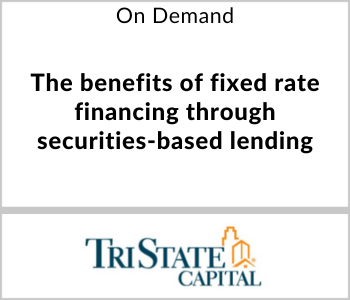Overview: |
| Title: The benefits of fixed rate financing through securities-based lending |
| Date: Friday, May 30, 2025 |
| Time: 1:00 PM Eastern Daylight Time |
| Duration: 1 hour |
Register Now: |
| Already Registered? |
Summary: |
||
|
Accepted for 1 CFP/ IWI / CFA CE Credit |
||
Speakers: |
||
|
||
Craig Coffey, SVP – National Sales Director of Private Bank Lending for TriState Capital Bank, is responsible for creating innovative solutions to help sophisticated advisors serve their clients. Prior to joining TriState Capital, Craig cofounded O2X, where he served as general counsel and COO. He holds a bachelor’s degree in engineering from Northeastern University and a Juris Doctor degree from Boston College. Craig lives in Cohasset, MA, with his wife and two children, enjoys reading history, and has completed three 50-mile marathons. |
||
|
||
Bart Brush serves as Executive Vice President and Chief Financial Officer of TriState Capital Bank, where he is responsible for the Bank’s finance, capital markets, accounting, and reporting teams. As chair of the bank’s Asset and Liability Management Committee (ALCO), Bart leads capital and liquidity strategy, interest rate risk management, securities portfolio investment, and regulatory stress testing activities. He also oversees client-facing initiatives such as the marketing and execution of interest rate swaps and options and the marketing of deposit products, as well as providing other Capital Markets related products, information, and insight. Prior to joining TriState Capital Bank in 2007, Bart was part of the Financial Institutions Group at PNC Capital Markets. He holds a bachelor’s degree in economics from Harvard University as well as an MBA from The Tepper School of Business at Carnegie Mellon University. Currently, Bart resides in Pittsburgh, PA with his wife and three children, where he enjoys watching his kids play sports, spending time with friends and family, running, and coaching baseball. |
||
|
||
Mackenzie Waychoff, Capital Markets Derivative Sales Manager for TriState Capital Bank, is responsible for providing ongoing administration and maintenance of the Bank’s interest rate swap program while maximizing swap process efficiencies across both the Commercial Bank and Private Bank. Prior to this position, Mackenzie was in the role of regional sales representative of Private Bank for TriState Capital. She has also served as a loan application reviewer for the Bank. She holds a bachelor’s degree in Psychology from Penn State University, as well as series 7 and 63 securities licenses. |






